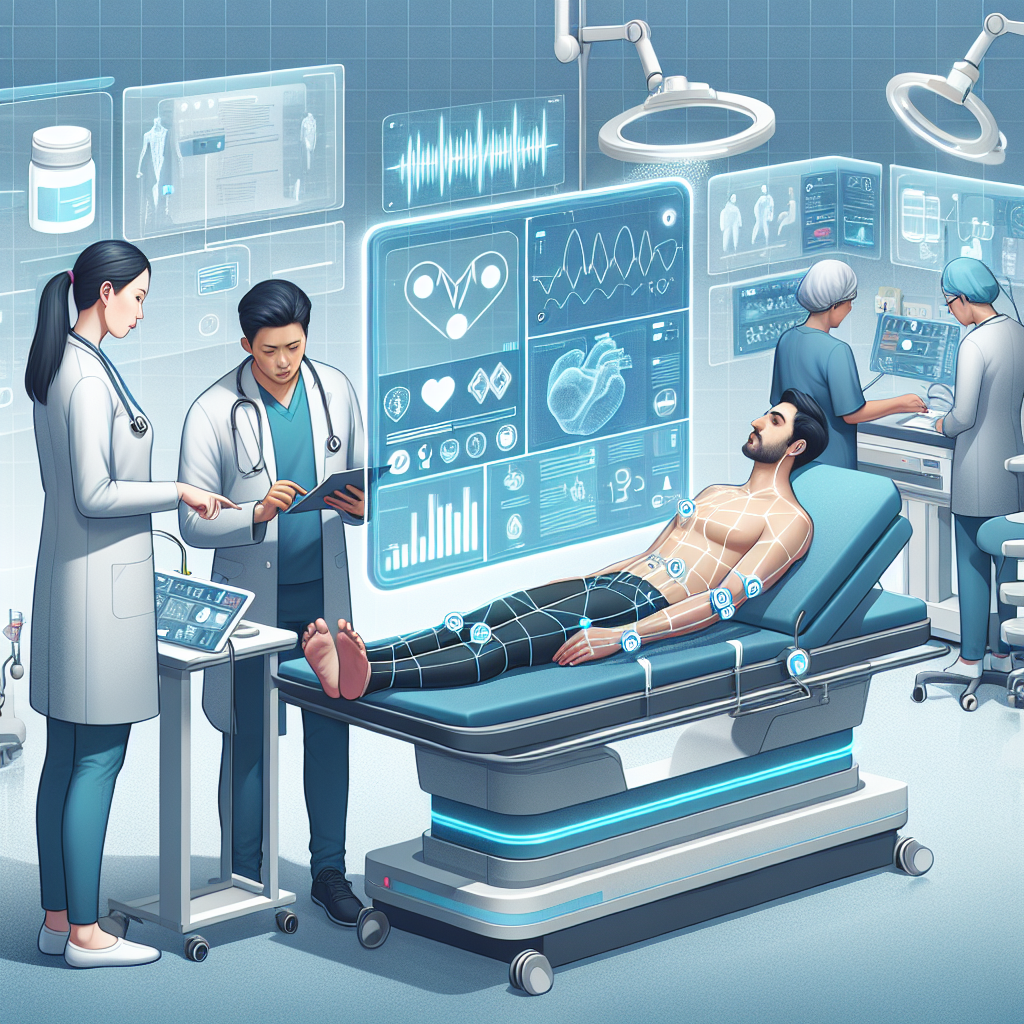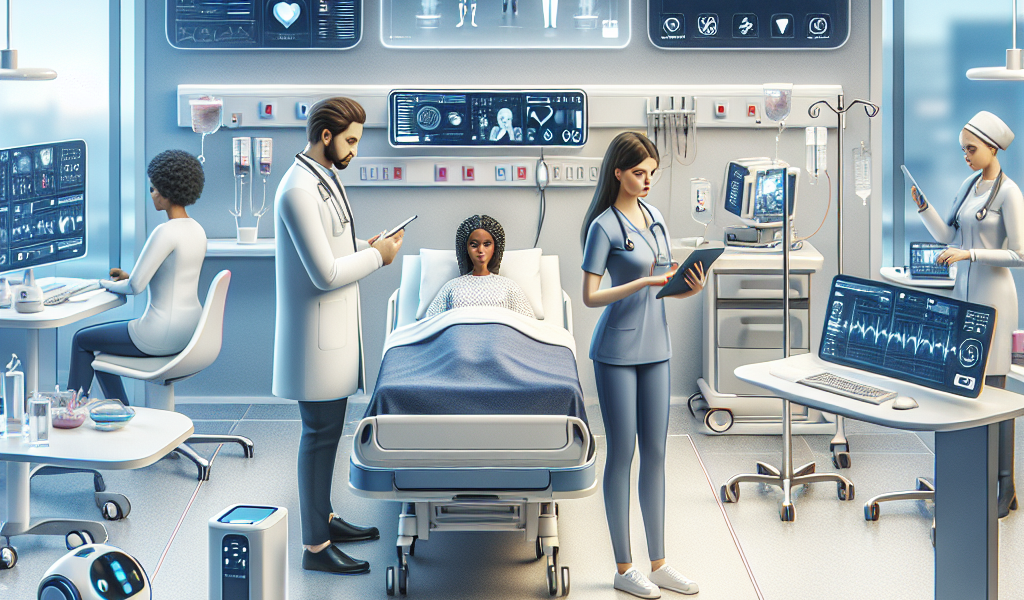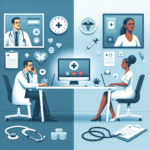-
Table of Contents
“Unlocking Wellness: The Future of Smart Healthcare Solutions”
Introduction

In an era where technology is rapidly transforming various sectors, the healthcare industry stands at the forefront of this digital revolution. Smart healthcare solutions, encompassing a range of advanced technologies such as artificial intelligence, Internet of Things (IoT), telemedicine, and wearable devices, are redefining the way medical services are delivered and managed. These innovations promise to enhance patient care, improve diagnostic accuracy, streamline hospital operations, and reduce healthcare costs. By leveraging data analytics and real-time monitoring, smart healthcare solutions offer personalized treatment plans and proactive health management, ultimately leading to better health outcomes and increased patient satisfaction. This exploration delves into the myriad benefits of smart healthcare solutions, highlighting their potential to revolutionize the healthcare landscape and address some of the most pressing challenges faced by the industry today.
Enhancing Patient Care Through Smart Healthcare Solutions
In recent years, the healthcare industry has witnessed a remarkable transformation, driven by the advent of smart healthcare solutions. These innovative technologies are not only revolutionizing the way medical professionals deliver care but also significantly enhancing patient outcomes. As we delve into the myriad benefits of smart healthcare solutions, it becomes evident that their impact is both profound and far-reaching.
One of the most notable advantages of smart healthcare solutions is their ability to improve patient monitoring. Traditional methods of patient monitoring often involve periodic check-ups and manual data entry, which can be time-consuming and prone to errors. However, with the integration of smart devices such as wearable sensors and remote monitoring systems, healthcare providers can now continuously track vital signs and other health metrics in real-time. This continuous monitoring allows for the early detection of potential health issues, enabling timely interventions and reducing the risk of complications.
Moreover, smart healthcare solutions facilitate better communication between patients and healthcare providers. Telemedicine platforms, for instance, have become increasingly popular, especially in the wake of the COVID-19 pandemic. These platforms enable patients to consult with their doctors from the comfort of their homes, eliminating the need for travel and reducing the burden on healthcare facilities. Additionally, telemedicine ensures that patients in remote or underserved areas have access to quality medical care, bridging the gap in healthcare disparities.
Another significant benefit of smart healthcare solutions is the enhancement of personalized medicine. By leveraging data analytics and artificial intelligence, healthcare providers can now tailor treatments to individual patients based on their unique genetic makeup, lifestyle, and medical history. This personalized approach not only improves the efficacy of treatments but also minimizes the risk of adverse reactions. For example, pharmacogenomics, a field that studies how genes affect a person’s response to drugs, allows doctors to prescribe medications that are most likely to be effective for a particular patient, thereby optimizing therapeutic outcomes.
Furthermore, smart healthcare solutions contribute to more efficient healthcare management. Electronic health records (EHRs) have replaced cumbersome paper records, streamlining the documentation process and ensuring that patient information is easily accessible to authorized personnel. This seamless access to patient data enhances coordination among healthcare teams, leading to more informed decision-making and better continuity of care. Additionally, EHRs reduce administrative burdens, allowing healthcare providers to focus more on patient care rather than paperwork.
Preventive care is another area where smart healthcare solutions are making a significant impact. Predictive analytics, powered by machine learning algorithms, can identify individuals at high risk for certain conditions, such as diabetes or heart disease, before they manifest. By proactively addressing these risks through lifestyle modifications and preventive measures, healthcare providers can help patients avoid the onset of chronic diseases, ultimately improving their quality of life and reducing healthcare costs.
Lastly, the integration of smart healthcare solutions fosters a more patient-centric approach to care. Mobile health applications empower patients to take an active role in managing their health by providing them with tools to track their progress, set health goals, and receive personalized recommendations. This increased engagement not only promotes healthier behaviors but also strengthens the patient-provider relationship, as patients feel more informed and involved in their care journey.
In conclusion, the benefits of smart healthcare solutions are manifold, ranging from improved patient monitoring and communication to personalized medicine and preventive care. As these technologies continue to evolve, they hold the promise of transforming the healthcare landscape, making it more efficient, accessible, and patient-centered. Embracing these innovations will undoubtedly pave the way for a healthier future, where quality care is within reach for all.
Reducing Healthcare Costs with Advanced Technology
In recent years, the healthcare industry has witnessed a remarkable transformation, driven by the integration of advanced technology. This shift towards smart healthcare solutions is not only enhancing patient care but also significantly reducing healthcare costs. As hospitals and clinics adopt these innovative tools, the financial burden on both providers and patients is being alleviated, creating a more efficient and accessible healthcare system.
One of the primary ways smart healthcare solutions are reducing costs is through the implementation of telemedicine. By enabling remote consultations, telemedicine eliminates the need for patients to travel to healthcare facilities, thereby cutting down on transportation expenses and time off work. Moreover, it allows healthcare providers to reach a larger number of patients without the constraints of physical space, optimizing their time and resources. This increased efficiency translates to lower operational costs for healthcare facilities, which can then pass on the savings to patients.
In addition to telemedicine, wearable health devices are playing a crucial role in cost reduction. These devices, which monitor vital signs and other health metrics in real-time, provide continuous data that can be used to detect potential health issues before they become severe. Early detection and intervention can prevent costly emergency room visits and hospitalizations. For instance, a wearable device that monitors heart rate and detects irregularities can alert a patient to seek medical advice before a minor issue escalates into a life-threatening condition. This proactive approach not only improves patient outcomes but also reduces the financial strain on the healthcare system.
Furthermore, electronic health records (EHRs) have revolutionized the way patient information is managed. By digitizing medical records, EHRs facilitate seamless communication between different healthcare providers, ensuring that patients receive coordinated and efficient care. This reduces the likelihood of redundant tests and procedures, which are often a significant source of unnecessary healthcare costs. Additionally, EHRs streamline administrative processes, reducing the time and resources spent on paperwork and allowing healthcare professionals to focus more on patient care.
Artificial intelligence (AI) and machine learning are also making substantial contributions to cost reduction in healthcare. These technologies can analyze vast amounts of data to identify patterns and predict outcomes, aiding in the early diagnosis and treatment of diseases. For example, AI algorithms can analyze medical images with remarkable accuracy, assisting radiologists in detecting abnormalities that might be missed by the human eye. This not only speeds up the diagnostic process but also reduces the need for multiple tests, thereby cutting costs.
Moreover, AI-driven predictive analytics can help healthcare providers manage resources more effectively. By forecasting patient admissions and identifying trends in disease outbreaks, hospitals can better allocate staff and equipment, minimizing waste and ensuring that resources are used where they are most needed. This level of efficiency is crucial in reducing operational costs and improving the overall quality of care.
While the initial investment in smart healthcare solutions can be substantial, the long-term savings are undeniable. As these technologies continue to evolve and become more widely adopted, the potential for cost reduction will only increase. By embracing advanced technology, the healthcare industry is not only enhancing patient care but also creating a more sustainable and financially viable system.
In conclusion, the integration of smart healthcare solutions is proving to be a game-changer in reducing healthcare costs. Through telemedicine, wearable devices, electronic health records, and artificial intelligence, the industry is moving towards a more efficient and cost-effective model. As these technologies continue to advance, the benefits will become even more pronounced, ultimately leading to a healthier and more financially stable future for all.
Improving Medical Outcomes with Data-Driven Insights
In recent years, the healthcare industry has witnessed a transformative shift with the advent of smart healthcare solutions. These innovative technologies, which leverage data-driven insights, are revolutionizing the way medical professionals diagnose, treat, and manage patient care. By integrating advanced analytics, artificial intelligence, and interconnected devices, smart healthcare solutions are not only improving medical outcomes but also enhancing the overall patient experience.
One of the most significant benefits of smart healthcare solutions is their ability to provide real-time data. Wearable devices, such as smartwatches and fitness trackers, continuously monitor vital signs like heart rate, blood pressure, and oxygen levels. This constant stream of data allows healthcare providers to detect anomalies early, enabling timely interventions that can prevent complications. For instance, a sudden spike in blood pressure can be immediately flagged, prompting a healthcare provider to take swift action, potentially averting a serious health crisis.
Moreover, smart healthcare solutions facilitate personalized medicine. By analyzing vast amounts of data from various sources, including electronic health records and genomic information, these technologies can identify patterns and correlations that might be missed by human observation alone. This enables the development of tailored treatment plans that are specifically designed to meet the unique needs of each patient. Personalized medicine not only increases the effectiveness of treatments but also reduces the risk of adverse reactions, thereby improving patient outcomes.
Transitioning to another key advantage, smart healthcare solutions enhance the efficiency of medical practices. Automated systems and artificial intelligence can handle routine tasks such as scheduling appointments, managing patient records, and processing insurance claims. This automation frees up valuable time for healthcare professionals, allowing them to focus more on patient care rather than administrative duties. Additionally, predictive analytics can optimize resource allocation by forecasting patient admissions and discharges, ensuring that hospitals are adequately staffed and equipped to handle patient loads.
Furthermore, telemedicine, a component of smart healthcare, has gained immense popularity, especially in the wake of the COVID-19 pandemic. Telemedicine platforms enable patients to consult with healthcare providers remotely, reducing the need for in-person visits. This not only minimizes the risk of infection but also makes healthcare more accessible to individuals in remote or underserved areas. Patients can receive timely medical advice and prescriptions without the hassle of traveling long distances, thereby improving their overall health and well-being.
Another noteworthy benefit is the potential for improved chronic disease management. Smart healthcare solutions can continuously monitor patients with chronic conditions such as diabetes, hypertension, and asthma. By providing real-time feedback and alerts, these technologies help patients manage their conditions more effectively. For example, a diabetic patient can receive instant notifications about their blood sugar levels, along with recommendations for dietary adjustments or medication dosages. This proactive approach to disease management can significantly reduce hospitalizations and improve the quality of life for patients.
In conclusion, the integration of smart healthcare solutions into the medical field is proving to be a game-changer. By harnessing the power of data-driven insights, these technologies are enhancing the accuracy of diagnoses, personalizing treatment plans, streamlining medical practices, and making healthcare more accessible. As the healthcare industry continues to evolve, the adoption of smart healthcare solutions will undoubtedly play a crucial role in improving medical outcomes and transforming patient care for the better.
Conclusion
In conclusion, exploring the benefits of smart healthcare solutions reveals significant potential for improving patient outcomes, enhancing operational efficiency, and reducing healthcare costs. These technologies, including telemedicine, wearable devices, and AI-driven diagnostics, offer personalized care, real-time monitoring, and data-driven decision-making. By integrating smart solutions, healthcare systems can provide more accurate diagnoses, timely interventions, and continuous patient support, ultimately leading to a more effective and patient-centered healthcare experience.





